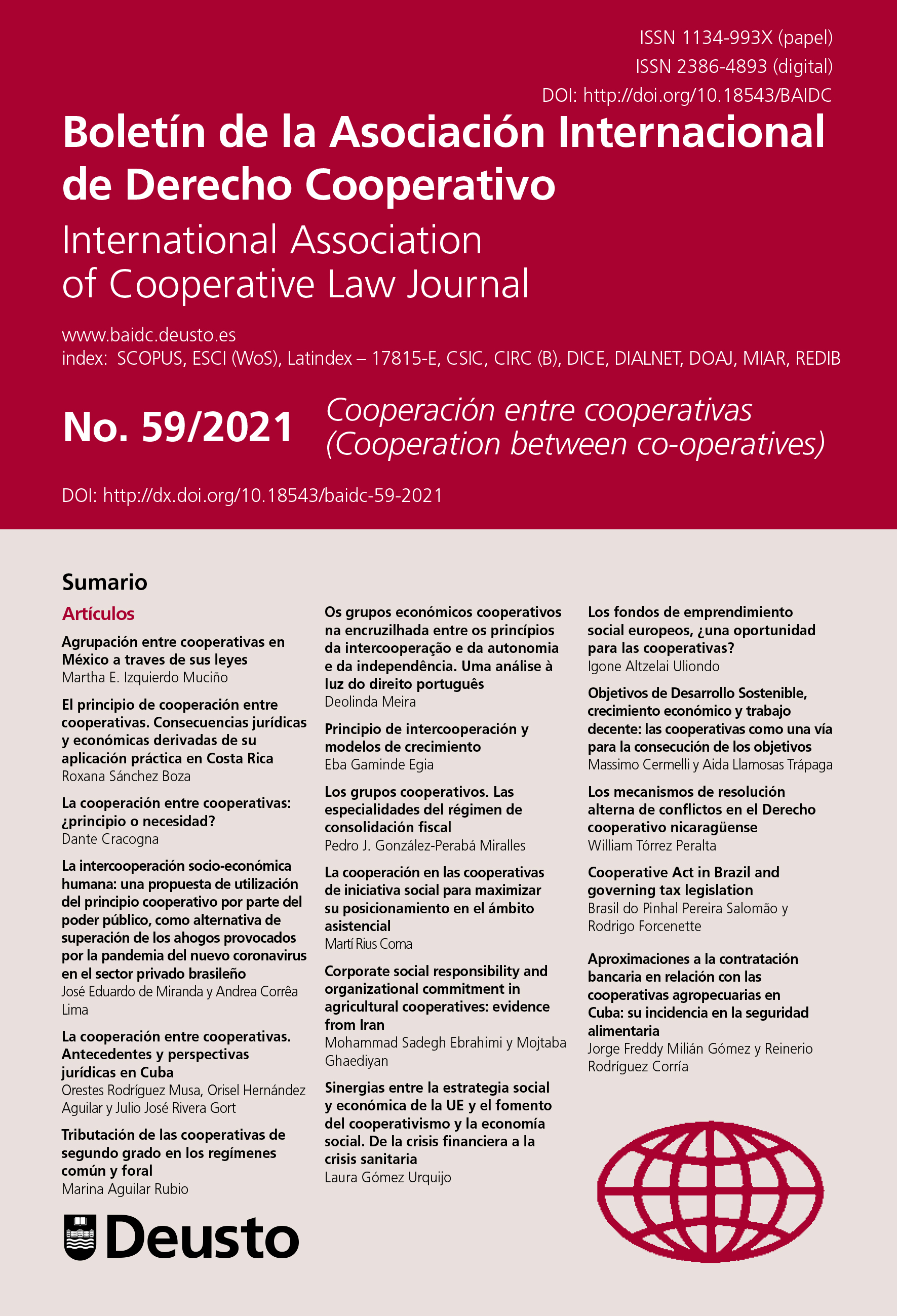Taxation of second-degree cooperatives in the common State tax system and the Basque regional tax systemTaxation of second-degree cooperatives in the common State tax system and the Basque regional tax system
Abstract
The Sixth Cooperative Principle states that cooperatives best serve their members and the cooperative movement itself by working together through local, regional, national and international structures. This «cooperation among cooperatives» has usually manifested itself in the creation of second or subsequent degree cooperatives. This paper analyses the taxation of second-degree cooperatives, focusing on the three issues which seem to be fundamental in this matter: the taxation of the establishment of a new second-degree cooperative or the incorporation into an existing one; the tax regime which corresponds to a second-degree cooperative according to its qualification for this purpose; and, finally, the tax treatment of the cooperative’s operations with members and with third parties.
Received: 25. May 2021
Accepted: 16 September 2021
Downloads
References
Aguilar Rubio, Marina. 2016. «Análisis crítico de la fiscalidad de las cooperativas de segundo grado como fórmula de integración». REVESCO Revista de Estudios Cooperativos, núm. 126: 118-132.
Alfonso Sánchez, Rosalía. 2000. La integración cooperativa y sus técnicas de realización: La cooperativa de segundo grado. Editorial Tirant lo Blanch: Valencia.
Alguacil Marí, María Pilar. 2017. «Régimen tributario de los grupos cooperativos en Euskadi». Forum Fiscal, la revista tributaria de Álava, Bizkaia y Gipuzkoa, n.º 237: 1-18.
Alguacil Marí, María Pilar. 2012. «Tratamiento fiscal de las operaciones de las cooperativas con sus miembros». Instituto de investigación en Economía social y cooperativa de la Universidad de Valencia: 1-15.
Embid Irujo, José Miguel. 1998. «Problemas actuales de la integración cooperativa». Revista de Derecho Mercantil. n.º 227, I: 7 y ss.
Gadea Soler, Enrique. 2010. «Crisis e intercooperación: las cooperativas de segundo o ulterior grado como instrumento de colaboración empresarial». Boletín de la Asociación Internacional de Derecho Cooperativo. Deusto. n.º 44: 251-262.
Garrido Pulido, Tomás, Puentes Poyatos, Raquel y Navarro Heras, Emilio. 2007. «Fiscalidad de las cooperativas de segundo grado». Revesco. Revista Española de Estudios cooperativos. n.º 91: 77-10.
Peris García, Purificación. 2002. «Los procesos de concentración y de integración cooperativa y su tributación: Especial referencia a las fusiones y a la creación de grupos cooperativos». CIRIEC- España. Revista Jurídica de Economía Social y Cooperativa, n.º 13, p. 69-109.
Rosembuj, Tulio. 1988. «Economía de la cooperativa de segundo grado». Anuario de Estudios Cooperativos. Deusto, n.º 1: 166-182.
Copyright (c) 2021 University of Deusto

This work is licensed under a Creative Commons Attribution-NonCommercial 4.0 International License.
The authors, by submitting their manuscripts to the International Association of Cooperative Law Journal, accept the conditions listed below on copyright and undertake to comply with them.
1. Assignment of rights
The Publisher (University of Deusto) retains the copyright for this publication.
The authors, by submitting their manuscripts to the International Association of Cooperative Law Journal (BAIDC), without signing any document of assignment, grant to the Publisher (University of Deusto), royalty-free, the distribution, public communication, and reproduction rights of their work subject of publication in the International Association of Cooperative Law Journal (BAIDC), whichever the media may be, now known or developed in the future, for educational and scholarly purposes including the permission to include it in the databases where this Journal is indexed.
2. Authorship
The authors must be the sole creators of the work or legally acting on behalf of and with the full agreement of all the co-authors.
The corresponding author should ensure that all appropriate co-authors and no inappropriate co-authors are included on the manuscript, and that all co-authors have seen and approved the final version of the article and have agreed to its submission for publication in the Journal.
In order to avoid the risk of ghostwriting or fictive/purloined authorship it is advisable that before the document is submitted all authors agree upon their contributions and upon the order in which they will appear on the list of co-authors.
Authors warrant that no permissions or licences of any kind have been granted or will be granted that might infringe the rights granted to the Publisher (University of Deusto).
The authors assume the responsibility for obtaining all the necessary licences for the reproduction in their manuscripts of any text, material or illustration coming from another author, institution or publication.
3. Copyright and Code of conduct
Authors warrant that their work is original; has not been previously copyrighted or published in any form; is not under consideration for publication elsewhere; its submission and publication do not violate the Ethical Guidelines of the BAIDC and any codes (of conduct), laws or any rights of any third party.
4. Dissemination under Open Access regime
Upon its publication, the content of any Issue of International Association of Cooperative Law Journal (BAIDC), can be accessed, read, downloaded, copied, and distributed freely for non-commercial purposes, without prior permission from the Publisher or the author; provided the original work is properly cited and any changes to the original are clearly indicated.
5. Reuse of the article by the authors
Authors retain the right to present, display, distribute, develop, and republish their work, as long as they clearly indicate in the first footnote that the work was published in International Association of Cooperative Law Journal (BAIDC), for the first time, indicating the Issue number, year, pages, and DOI (if applicable).
Legal notice
Any use of the content of the paper against the rules set above in any medium or format, now known or developed in the future, requires prior written permission of the copyright holder.
The liabilities that may arise from complaints for publishing plagiarised articles are the sole responsibility of the authors.


.jpg)
.jpg)
.jpg)
1.jpg)
.jpg)
.jpg)







